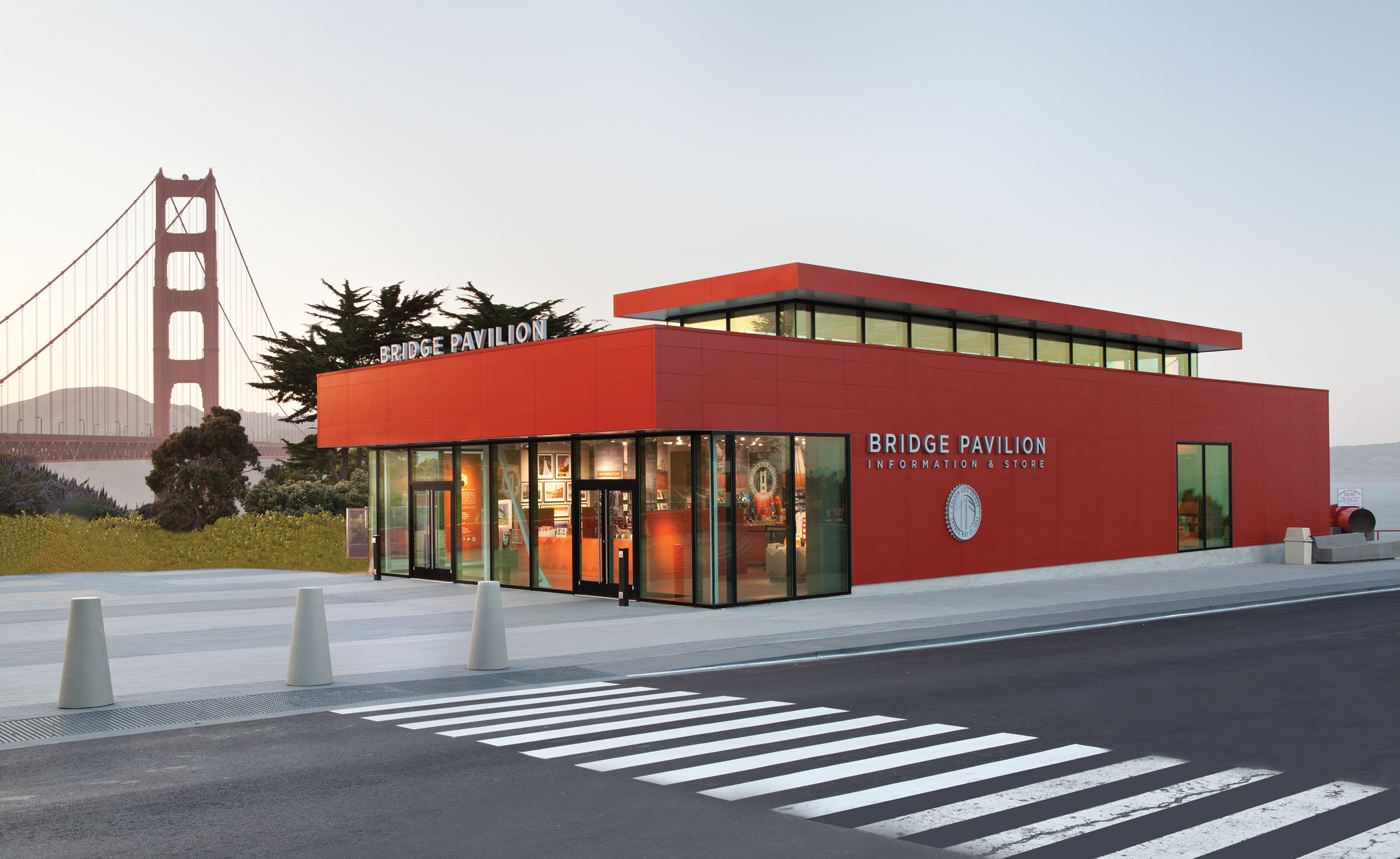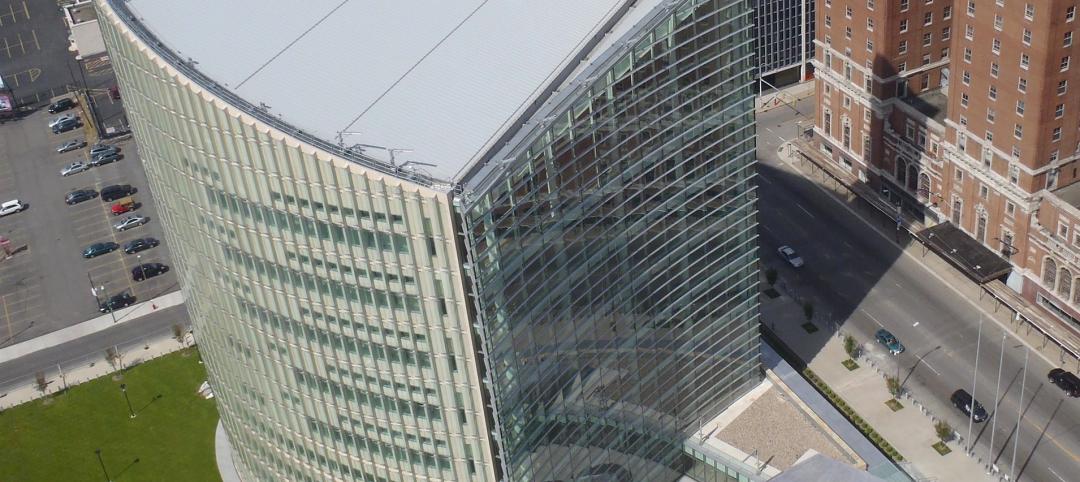The Golden Gate Bridge is acclaimed as one of the world's most beautiful bridges. With its tremendous towers, sweeping main cables, and great span, it is a sensory beauty featuring color, sound, and light. Celebrating 75 years, the bridge can be a very busy place; it is estimated that about nine million people from around the world visit the bridge each year.
When asked by the Golden Gate National Parks Conservancy to serve as the lead architect for the 3,426-sf Golden Gate Bridge Pavilion, Project Frog was in search for a fiber cement product that included a moisture management system. Looking at several different manufacturers, price points, and aesthetics, Project Frog landed on Nichiha’s Illumination Series panels through a client who had recently used the product on one of their buildings.
The Golden Gate Bridge Pavilion was developed with the latest technology and innovation available. The building’s cladding will serve to call attention to the structure itself, with the famous international orange color on three sides and a storefront consisting entirely of glass, floor to ceiling.
Project Frog was intrigued by the plethora of physical properties of Nichiha panels, including durability, panel proportions, clipping system, texture/finish, V-groove panel joints, and the ability to utilize Nichiha’s Color Xpressions System, where Nichiha will match any paint manufacturer’s colors in satin finish. The patented clip system allows for panel joints to fall off stud locations as well.
“When you have a landmark with such strong national recognition and commitment, you know you have the right combination of product advantages,” states Doug Kennard, territory manager at Nichiha USA. “This Golden Gate Bridge Pavilion project typifies all the aspects of the Nichiha brand... providing quality exterior cladding solutions that deliver on high performance and bring to life the look our clients desire. Plus if we can also lower the installed cost and shorten the installation process, we’ve done our job.”
The new Golden Gate Bridge Pavilion is made from environmentally responsible materials and has abundant green features including: high-performance, super-insulating glass units incorporating suspended film technology; abundant natural daylight; complete LED lighting system for artificial light; ultra-high efficiency furnace with economizer function; and low-flow commercial plumbing fixtures; in addition to Nichiha’s sustainable Illumination Series panels, which contain 40 percent recycled content.
The new Golden Gate Bridge Pavilion will include interpretive display elements and artifacts alongside retail merchandise. Not only will it teach its visitors about the historical significance of the building, but it will also provide educational information about sustainable building techniques, energy performance, and environmental responsibility. +
Related Stories
AEC Innovators | Mar 3, 2023
Meet BD+C's 2023 AEC Innovators
More than ever, AEC firms and their suppliers are wedding innovation with corporate responsibility. How they are addressing climate change usually gets the headlines. But as the following articles in our AEC Innovators package chronicle, companies are attempting to make an impact as well on the integrity of their supply chains, the reduction of construction waste, and answering calls for more affordable housing and homeless shelters. As often as not, these companies are partnering with municipalities and nonprofit interest groups to help guide their production.
Codes | Mar 2, 2023
Biden Administration’s proposed building materials rules increase domestic requirements
The Biden Administration’s proposal on building materials rules used on federal construction and federally funded state and local buildings would significantly boost the made-in-America mandate. In the past, products could qualify as domestically made if at least 55% of the value of their components were from the U.S.
AEC Innovators | Mar 2, 2023
Turner Construction extends its ESG commitment to thwarting forced labor in its supply chain
Turner Construction joins a growing AEC industry movement, inspired by the Design for Freedom initiative, to eliminate forced labor and child labor from the production and distribution of building products.
AEC Innovators | Feb 28, 2023
Meet the 'urban miner' who is rethinking how we deconstruct and reuse buildings
New Horizon Urban Mining, a demolition firm in the Netherlands, has hitched its business model to construction materials recycling. It's plan: deconstruct buildings and infrastructure and sell the building products for reuse in new construction. New Horizon and its Founder Michel Baars have been named 2023 AEC Innovators by Building Design+Construction editors.
Codes and Standards | Feb 8, 2023
GSA releases draft of federal low embodied carbon material standards
The General Services Administration recently released a document that outlines standards for low embodied carbon materials and products to be used on federal construction projects.
Concrete | Jan 24, 2023
Researchers investigate ancient Roman concrete to make durable, lower carbon mortar
Researchers have turned to an ancient Roman concrete recipe to develop more durable concrete that lasts for centuries and can potentially reduce the carbon impact of the built environment.
Standards | Jan 19, 2023
Fenestration Alliance updates liquid applied flashing standard
The Fenestration and Glazing Industry Alliance (FGIA) published an update to its Liquid Applied Flashing Standard. The document contains minimum performance requirements for liquid applied flashing used to provide water-resistive seals around exterior wall openings in buildings.
Sponsored | Resiliency | Dec 14, 2022
Flood protection: What building owners need to know to protect their properties
This course from Walter P Moore examines numerous flood protection approaches and building owner needs before delving into the flood protection process. Determining the flood resilience of a property can provide a good understanding of risk associated costs.
K-12 Schools | Nov 30, 2022
School districts are prioritizing federal funds for air filtration, HVAC upgrades
U.S. school districts are widely planning to use funds from last year’s American Rescue Plan (ARP) to upgrade or improve air filtration and heating/cooling systems, according to a report from the Center for Green Schools at the U.S. Green Building Council. The report, “School Facilities Funding in the Pandemic,” says air filtration and HVAC upgrades are the top facility improvement choice for the 5,004 school districts included in the analysis.
University Buildings | Nov 13, 2022
University of Washington opens mass timber business school building
Founders Hall at the University of Washington Foster School of Business, the first mass timber building at Seattle campus of Univ. of Washington, was recently completed. The 84,800-sf building creates a new hub for community, entrepreneurship, and innovation, according the project’s design architect LMN Architects.
















